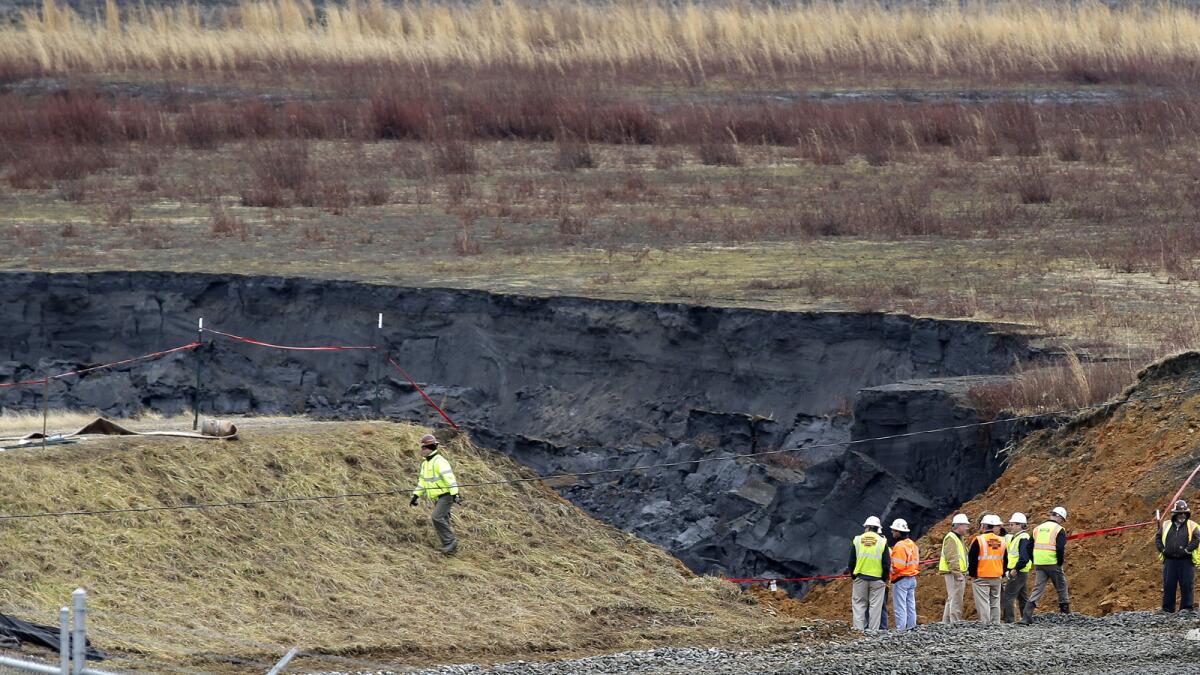Conservation groups say Duke Energy plant leaks coal ash into N.C. river

- Share via
Durham, N.C. — Three environmental groups said Thursday that they have discovered toxic coal ash leaks from a retired Duke Energy coal plant in North Carolina, allegedly polluting the Yadkin River nine months after a massive coal ash spill from a Duke plant fouled the nearby Dan River in February.
The groups, which posted photos of the reported leaks, said the alleged discharges have not been disclosed by Duke Energy or by state enviromental regulators. The leaks stretch for at least a quarter of a mile along the Yadkin River in central North Carolina, coating the river’s banks with orange sludge, the groups said.
Coal ash stored in 33 ponds at 14 Duke Energy plants in North Carolina has been a volatile political issue since the Feb. 2 spill coated 70 miles of the Dan River with toxic sludge from an ash storage pond at Duke’s Dan River plant.
A Duke Energy spokesman said the utility regularly surveys all its coal ash sites for seeps, including the Yadkin river plant, and reports all findings to state environmental regulators.
“Seeps occur at low flows and contain low levels of constitutents, so the Yadkin River would be continue to be well protected and would not be influenced by these type of flows,’’ said the spokesman, Jeff Brooks.
A spokesman for the state Department of Environmental and Natural Resources said the agency will visit the Yadkin River site to test water quality “to determine if there are any exceedances of water quality standards.”
The spokesman, Jamie Kritzer, said the agency would take “appropriate actions’’ based on the results.
The environmental groups said independent testing found high levels of pollutants at Duke’s Buck Power Plant on the Yadkin River. Levels of cadmium were eight times the amount permitted for ground or surface water, the groups said. Arsenic levels were three times the legal limit, they said.
“These latest tests don’t just confirm our fears -- they show that the toxic loading into the water is actually far worse than we’d imagined,’’ said Peter Harrison, an attorney for Waterkeeper Alliance.
Both the Yadkin River and the Dan River coal-fired plants had been decommissioned, but coal ash remains stored in holding ponds. A rupture of a pipe beneath a pond at the Dan River plant caused the ash spill in February. Coal ash is the waste material left after coal is burned for energy.
Harrison said the Yadin River leaks were discovered in November, when a member of the Yadkin Riverkeeper environmental group noticed orange stains along the river banks. The Yadkin Riverkeeper, Waterkeeper Alliance and the Southern Environmental Law Center released testing results for the riverbank material Thursday.
The law center represents several conservation groups and other organizations in state and federal lawsuits aimed at forcing Duke Energy to clean up its coal ash sites.
“It was deeply unsettling to find that known coal ash contaminants have been leaking directly into the Yadkin River below the waterline for an undetermined period of time,’’ said Yadkin Riverkeeper Will Scott.
Harrison, from Waterkeeper Alliance, said residents of a nearby community known as Dukeville rely on private wells near the river and power plant for their drinking water.
“There’s a quarter-mile of river bank just bleeding out with this nasty orange-colored coal ash seep’’ that threatens groundwater, Harrison said.
Earlier this year, Waterkeeper Alliance tested well water in the community and said it found contaminates that exceeded levels allowed by the state. Residents have complained about possible contamination from unlined coal ash ponds at the plant.
Brooks, the Duke spokesman, said the orange color may be a result of iron bacteria, which he described as “non-harmful bacteria that occur commonly in this area becaue of iron-rich soils.’’
The Buck power plant, named after company co-founder James Buchanan “Buck’’ Duke, opened in 1926 and was shuttered in 2013. The facility is now a natural gas-fired plant.
Last summer, North Carolina’s legislature responded to the Dan River spill with legislation that requires Duke to close its coal ash storage sites. The utility must close the four most vulnerable sites by 2019 and all sites by 2029.
Duke Energy has estimated that the process will cost $10 billion. An independent scientific study estimated last month that it will cost more than $300 million to clean up the Dan River spill, which clogged the river with 39,000 tons of coal ash and 27 million gallons of untreated ash wastewater.
Twitter: @davidzucchino
More to Read
Sign up for Essential California
The most important California stories and recommendations in your inbox every morning.
You may occasionally receive promotional content from the Los Angeles Times.














